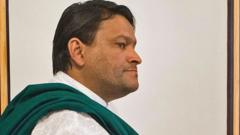Muhsin Hendricks, a pioneering figure advocating for LGBTQ+ rights within Islam, was fatally shot, prompting a re-evaluation of safety within the community. His legacy as a trailblazer for acceptance shines amidst ongoing struggles against extremism and exclusion in religious circles.
The Legacy of Muhsin Hendricks: A Beacon for LGBTQ+ Rights in Faith Communities

The Legacy of Muhsin Hendricks: A Beacon for LGBTQ+ Rights in Faith Communities
The tragic death of South Africa's first openly gay imam, Muhsin Hendricks, underscores both the threats faced by the LGBTQ+ community and their resolve for change.
Muhsin Hendricks, South Africa's first openly gay imam, was shot and killed in a tragic incident that has left the LGBTQ+ community mourning while igniting calls for change. The 57-year-old Hendricks was gunned down in Gqeberha, prompting fear within the community but also a determination to continue advocating for acceptance in religious circles. Reverend Toni Kruger-Ayebazibwe recalled Hendricks as a "gentle spirit" who profoundly impacted those around him, emphasizing the massive gap his absence creates.
His murder has raised questions about the motives behind it, especially considering Hendricks was officiating interfaith heterosexual marriages at the time, despite traditional norms that rarely recognize such unions. The Al-Gurbaah Foundation, which Hendricks co-founded, confirmed he was in Gqeberha for this purpose. His willingness to advocate for LGBTQ+ rights even in perilous circumstances is a testament to his pioneering spirit.
Although South Africa is a leader in LGBTQ+ rights with the legalization of same-sex marriage in 2006, many still experience discrimination and violence. The Muslim Judicial Council (MJC) and the United Ulama Council of South Africa (UUCSA) condemned the violence against Hendricks; however, traditional imams largely ostracized him for his views on same-sex relations in Islam.
Hendricks, who came out as gay in 1996 after being in a heterosexual marriage, established The Inner Circle to support queer Muslims who wish to reconcile their faith and identity. His actions have encouraged many across the globe to follow his path, yet the backlash from conservative forces remains a reality, leading to calls for enhanced security measures within the LGBTQ+ community.
Experts in Islamic studies, such as Dr. Fatima Essop, expressed disbelief at the hateful sentiments circulating after the shooting, pointing out that these attitudes starkly contrast with the essential principles of compassion within Islam. Reverend Kruger-Ayebazibwe added that despite the fear and uncertainty stemming from Hendricks' tragic fate, the pursuit for LGBTQ+ acceptance will not falter.
As plans for a memorial honoring Hendricks' contributions unfold, his legacy of resilience continues to inspire activists who fight for recognition and respect within faith communities. Teboho Klaas from The Other Foundation states that, while Hendricks may no longer be with them, his impact—through inspiring countless individuals—is everlasting.






















